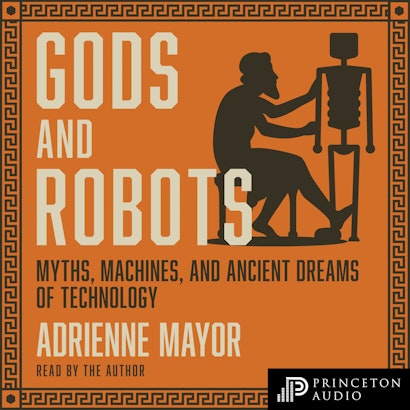The first robot to walk the earth was a bronze giant called Talos. This wondrous machine was created not by MIT Robotics Lab, but by Hephaestus, the Greek god of invention. More than 2,500 years ago, long before medieval automata, and centuries before technology made self-moving devices possible, Greek mythology was exploring ideas about creating artificial life—and grappling with still-unresolved ethical concerns about biotechne, “life through craft.” In this compelling book, Adrienne Mayor tells the fascinating story of how ancient Greek, Roman, Indian, and Chinese myths envisioned artificial life, automata, self-moving devices, and human enhancements—and how these visions relate to and reflect the ancient invention of real animated machines.
As early as Homer, Greeks were imagining robotic servants, animated statues, and even ancient versions of Artificial Intelligence, while in Indian legend, Buddha’s precious relics were defended by robot warriors copied from Greco-Roman designs for real automata. Mythic automata appear in tales about Jason and the Argonauts, Medea, Daedalus, Prometheus, and Pandora, and many of these machines are described as being built with the same materials and methods that human artisans used to make tools and statues. And, indeed, many sophisticated animated devices were actually built in antiquity, reaching a climax with the creation of a host of automata in the ancient city of learning, Alexandria, the original Silicon Valley.
A groundbreaking account of the earliest expressions of the timeless impulse to create artificial life, Gods and Robots reveals how some of today’s most advanced innovations in robotics and AI were foreshadowed in ancient myth—and how science has always been driven by imagination. This is mythology for the age of AI.
Awards and Recognition
- One of BookAuthority’s Three Best New Robotics Audiobooks To Read in 2019
"Absorbing. . . . [Mayor is] an accessible and engaging writer."—Peter Thonemann, Wall Street Journal
"In her new book, Gods and Robots, Adrienne Mayor draws comparisons between mythical androids and ancient robots and the AI of today. . . . Through detailed storytelling and careful analysis of popular myths, Mayor urges readers to consider lessons learned from these stories as we set about creating a new world with AI. . . . Wonderful storytelling, thorough research, and impressive expertise."—Sarah Olson, Science
"A fascinating unpacking of ancient myths that feature robots and other lifelike beings, some of which bear an eerie resemblance to modern technology. . . . In her insightful analyses of these tales, Mayor is approachable and engaging, and she infuses many familiar stories with new energy in the context of technology. She adroitly explores the ethical aspects of artificial life, addressing big questions about sentience and agency through the lens of ancient ideas. She also makes a convincing argument that these imagined machines anticipated advances that are considered cutting-edge today. Ultimately, she leaves readers in awe of these thinkers who dreamed of ‘androids’ long before it was conceivable to build them. A collection of wondrous tales that present ancient myths as the proto-science fiction stories they are."—Kirkus
"The Greeks thought of everything, including sci-fi tropes such as androids and artificial intelligence, according to this lively study of mythology and technology. . . . Mayor’s exploration of the endless inventiveness of the Greek imagination makes for an engrossing read."—Publishers Weekly
"It is a place where megalomaniac leaders with an insatiable appetite for knowledge develop artificial intelligence and robots that pose grave dangers to humanity. Silicon Valley? No, Greek mythology."—Mark Bridge, The Times
"Dr. Mayor urges top tech bosses to closely analyse the stories of the Greeks as we close in on a future dominated by automated technologies."—Harry Pettit, Daily Mail
"This is an excellent source book for confronting political and technological hubris then and now, the earliest arguable traces of modern fears."—Peter Stothard, The Spectator
"The Greeks [Mayor argues] envisioned . . . advanced technological artifacts driven by internal machinery [and] establishes the engineered nature of androids like Talos and Pandora. [Her] close analysis finds echoes of real historical techniques [and] nicely refutes those critics who might claim that artificial life achieved through engineering was an idea beyond the conceptual horizon of the ancients."—William A. Wilson, Weekly Standard
"[An] astonishing chronicle."—Barbara Kiser, Nature
"Adrienne Mayor entertainingly re-examines the various versions of these myths that survive in written and visual form and speculates about their origins."—The Economist
"In Gods and Robots, Adrienne Mayor describes how, more than 2,500 years before the modern computer, people told tales of autonomous machines that could labor, entertain, kill and seduce. . . . 'The age-old stories,' she writes, 'raise questions of free will, slavery, the origins of evil, man’s limits, and what it means to be human.'"—Matthew Hutson, Washington Post
"In a breezy and thought-provoking account, Mayor describes how ancient Greek, Roman, Indian and Chinese myths expressed hopes and fears about human-made life long before conversational robots and computer chess champions flexed their algorithms."—Bruce Bower, Science News
"[A] brilliant book."—Enlightened Economist
"In her remarkable book Gods and Robots: Machines, Myths, and Ancient Dreams of Technology, Stanford Professor Adrienne Mayor gives a literate and creative history of the notion of delegating power and giving orders to man-made entities."—Michael Munger, American Institute of Economic Research
"Beautifully written."—Candida Moss, Daily Beast
"[A] masterful retelling of ancient tales."—Clara Bosak-Schroeder, Bryn Mawr Classical Review
"There is much to intrigue the general reader, with enough to challenge the more academic reader."—Cath Milnes, Classics for All Reviews
"Mayor’s account works so well . . . because she assembles . . . fragments of images to generate a rich visual tapestry . . . The greatest strength of Gods and Robots is that it gives us a framework and a set of familiar stories with which we can negotiate our own times."—Michael John Goodman, British Society for Literature and Science
"Gods and Robots turned out to be a fascinating book on an unusual subject."—The Inquisitive Biologist
"Adrienne Mayor writes jargon-free prose laced with wit."—Barry Baldwin, Fortean Times
"The questions [Mayor] raises are significant and timely."—Ivana Petrovic, Greece and Rome
"This is a wonderful ‘eureka’ book for anyone in search of the deep origin story of robotics and AI . . . and a possible epiphany for Marvel fans and science-fiction and fantasy readers looking for more back story on their favorite superheroes."—Emily E. Auger, Mythlore Journal
"Gods and Robots is an excellent discussion of ancient ideas of technology and the potential such technology had to transform the ancient world and to inform the contemporary one. . . .[this book provides] a key introduction to the field of classical reception."—Alan Chadwick, Journal of Classics Teaching
"Gods and Robots is an absorbing study of ancient mythological and historical automata that explores their origins and significance in the ancient and modern worlds. It will intrigue anyone interested in mythology, ancient and modern robotics, and the genesis of artificial intelligence."—Georgina J. Henderson, Technology and Culture
“If you think robot ethics is only a modern problem, think again. As this fascinating book explains, robots have been envisioned—and feared—for thousands of years. Adrienne Mayor teleports us back to the ancient world, connecting the dots between mythology, ancient machines, and today’s robots and other emerging technologies—and helping us understand our visions and anxieties about automation and what it means to be human.”—Patrick Lin, coeditor of Robot Ethics 2.0: From Autonomous Cars to Artificial Intelligence
“Vivid and exhilarating, Gods and Robots shows that humanity has been grappling with the idea of artificial life since the dawn of history, repeatedly running up against the same ethical conundrums. With uncanny timing, the book reveals how antiquity illuminates much of today’s debates about AI, human-machine collaboration, and transhumanism.”—George Zarkadakis, author of In Our Own Image: Savior or Destroyer? The History and Future of Artificial Intelligence
“This brilliant and incomparable book will astonish readers by showing the real technologies that lie behind ancient mythology. Adrienne Mayor presents fascinating and entertaining stories for pondering the deep questions of artificial life. Gods and Robots is a beautiful book.”—M. Norton Wise, University of California, Los Angeles
“Teeming with living statues, mechanical soldiers, divine beings, astonishing craftsmen, and canny sorceresses, God and Robots is an evocative account of the ancient Greeks’ fascination with artificial life—one that reveals many resonances between ancient thinking and current debates around robotics and AI.”—E. R. Truitt, author of Medieval Robots
“Gods and Robots is a hugely enjoyable book. Adrienne Mayor tackles a fascinating area of ancient experience and imagination that has barely been explored hitherto, and she does so with originality and vigor.”—Armand D’Angour, University of Oxford
“Beautifully written and elegantly argued, Gods and Robots reminds us that we are not the first to experience the uncanny awe that comes with the thought that our technology might produce something like nature. Equally attuned to real objects and mythic imagination, Adrienne Mayor offers surprising insights about both antiquity and our hopes and fears in the face of today’s efforts to make autonomous machines.”—Peter T. Struck, author of Divination and Human Nature: A Cognitive History of Intuition in Classical Antiquity
“An eye-opening tour of humankind’s fascination with robots, androids, and automata from prehistory to now, Gods and Robots explores how our feelings about artificial life have always been intertwined with our feelings about humanity.”—A. E. Stallings, poet and translator of Hesiod’s Works and Days

